


Keywords: Serbia; rights and freedoms; national minorities; political parties; native language; culture; education; Vojvodina; Central Serbia; public life; national structure;
Helsinki Committee for Human Rights in Serbia and Humanitarian Centre for Integration and Tolerance from Novi Sad in the course of August and September 2002 carried out a research on the status of collective rights of national minorities in Serbia. That research covered 36 municipalities in Vojvodina and 16 municipalities in Central Serbia, that is municipalities inhabited by the largest number of national minorities according to the 1991 census.7 The goal of research was to establish the level of enforcement of collective rights of national minorities as prescribed by the domestic legislation and international standards. The research covered guaranteed collective rights of national minorities in the following areas: 1. The right to use mother tongue and alphabet 2. The right to education in mother tongue 3. The right to nurturing national culture and tradition 4. The right to information in mother tongue 5. The right to effective participation of national minorities in public life. This research was carried out by the two teams. One worked in the territory of the Autonomous Province of Vojvodina, while the other worked in Central, or more precisely, Eastern Serbia, Sandžak and South Serbia. Their work was divided in view of high concentration of minorities in those areas.
More...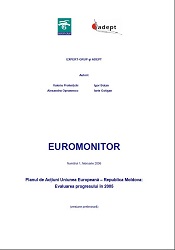
Keywords: Democratic institutions; Transnistria conflict; capacity of administration; juridical system; economic reforms; foreign trade; human traffic; migration; border control;
The reports in the "Euromonitor" series aim at independent and objective monitoring of the implementation process of the Republic of Moldova - European Union Action Plan. The actions adopted and implemented by both signatories of the Plan will be monitored quarterly. The action plan is a complex document, structured in 7 chapters, which provides for the implementation of about 300 actions, some defined more or less precisely, others very ambiguous. Unable to monitor such a complex document, the authors of "Euromonitor" focused on priority actions, identified in the Action Plan itself.
More...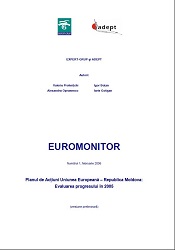
Keywords: Democratic institutions; Transnistria conflict; capacity of administration; juridical system; economic reforms; foreign trade; social development; human traffic; migration; border control;
The reports in the "Euromonitor" series aim at independent and objective monitoring of the implementation process of the Republic of Moldova - European Union Action Plan. The actions adopted and implemented by both signatories of the Plan will be monitored quarterly. The action plan is a complex document, structured in 7 chapters, which provides for the implementation of about 300 actions, some defined more or less precisely, others very ambiguous. Unable to monitor such a complex document, the authors of "Euromonitor" focused on priority actions, identified in the Action Plan itself.
More...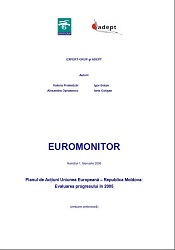
Keywords: Democratic institutions; Transnistria conflict; capacity of administration; juridical system; economic reforms; foreign trade; social development; human traffic; migration; border control;
The reports in the "Euromonitor" series aim at independent and objective monitoring of the implementation process of the Republic of Moldova - European Union Action Plan. The actions adopted and implemented by both signatories of the Plan will be monitored quarterly. The action plan is a complex document, structured in 7 chapters, which provides for the implementation of about 300 actions, some defined more or less precisely, others very ambiguous. Unable to monitor such a complex document, the authors of "Euromonitor" focused on priority actions, identified in the Action Plan itself.
More...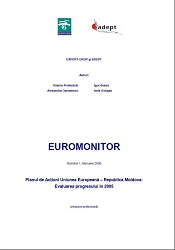
Keywords: Democratic institutions; Transnistria conflict; capacity of administration; juridical system; economic reforms; foreign trade; social development; human traffic; migration; border control;
The reports in the "Euromonitor" series aim at independent and objective monitoring of the implementation process of the Republic of Moldova - European Union Action Plan. The actions adopted and implemented by both signatories of the Plan will be monitored quarterly. The action plan is a complex document, structured in 7 chapters, which provides for the implementation of about 300 actions, some defined more or less precisely, others very ambiguous. Unable to monitor such a complex document, the authors of "Euromonitor" focused on priority actions, identified in the Action Plan itself.
More...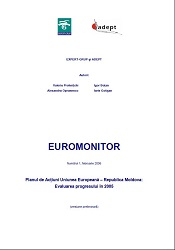
Keywords: Democratic institutions; Transnistria conflict; capacity of administration; juridical system; economic reforms; foreign trade; social development; human traffic; migration; border control;
The reports in the "Euromonitor" series aim at independent and objective monitoring of the implementation process of the Republic of Moldova - European Union Action Plan. The actions adopted and implemented by both signatories of the Plan will be monitored quarterly. The action plan is a complex document, structured in 7 chapters, which provides for the implementation of about 300 actions, some defined more or less precisely, others very ambiguous. Unable to monitor such a complex document, the authors of "Euromonitor" focused on priority actions, identified in the Action Plan itself.
More...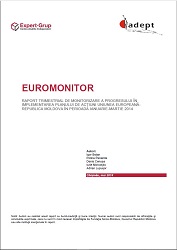
Keywords: Democratic institutions; Transnistria conflict; capacity of administration; juridical system; economic reforms; foreign trade; social development; migration; border control;
The reports in the "Euromonitor" series aim at independent and objective monitoring of the implementation process of the Republic of Moldova - European Union Action Plan. The actions adopted and implemented by both signatories of the Plan will be monitored quarterly. The action plan is a complex document, structured in 7 chapters, which provides for the implementation of about 300 actions, some defined more or less precisely, others very ambiguous. Unable to monitor such a complex document, the authors of "Euromonitor" focused on priority actions, identified in the Action Plan itself.
More...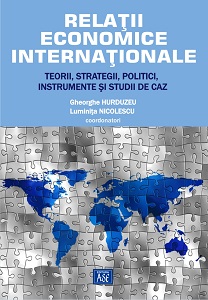
Objectives: - To understand the role of international organizations in the context of global governance - To synthesize the relationship between international organizations – globalization – global governance - To acquire basic knowledge in the field where international organizations operate - To analyse international organizations as global players
More...
Objectives: - To present the main components of the international business environment - To develop the competence of analysing the components of the international business environment (of different types of economic, political and legal systems existing on the globe, national culture, sociodemographic and technological factors affecting the development of international business)
More...
Objectives: - To present the main theoretical elements that apply in a company’s international marketing in the present globalization conditions - To form and develop competencies related to conducting the main international marketing activities (how to analyse and how to select a foreign market, how to take marketing decisions for foreign markets, etc.)
More...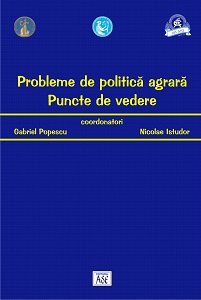
Keywords: economy; agrarian policy; land market; property relations; agricultural association and cooperation; rural economy; rural development; land consolidation; Romanian agricultural economics; agricultural
The volume "Agricultural Policy Issues. Points of view" brings together the opinions of specialists in the field, that reflects the current situation and the stage of evolution of the romanian agricultural sector, as well as the problems encountered in achieving and implementing the economic and productive legal framework of great interest for agriculture and its modernization. This book is a broad scientific event, which treats responsibly the defining segments of the economy and agricultural policy, with emphasis on issues related to the architecture of ownership and exploitation structures, property relations, involvement of the agricultural sector in association actions and cooperation under the influence of new modernization and development strategies subject to the area of scientific debate of the academic and university personalities present at the event. The present research focuses on the perimeter of economics and agricultural policy, addressing important strategy points, which capitalize on the scientific knowledge of specialists and decision-making bodies that forms the pyramid of romanian society, whose opinion completes a set of synergistic actions for efficiency and development of agriculture in Romania. The indisputable value of the scientific materials included in the volume can be recognized by the very essence of the debate – the involvement of the act of knowledge in finding solutions and opportunities for solving problems that affect the natural economic course of agriculture.
More...
Keywords: slogans;campaign themes;evaluation of political leaders;party evaluation;electoral behaviors;
The research was conducted in September 2018 based on 3 focus groups in which 28 people participated. The study aimed to evaluate the perception of the Dăncilă government, the evaluation of President Klaus Iohannis, Traian Băsescu, Eugen Tomac, Ludovic Orban, Dan Barna, the perception of PMP, PNL, USR, PSD, of the topics that will be debated in the campaign for the European elections. political relations, attitude towards the PMP, intention to vote for referendums on issues such as: no criminals in public office, the union of Moldova with Romania, electronic voting.
More...
Keywords: administrative issues;trust in political leaders;voting intentions;
The survey was conducted on May 13, 2017 on a sample of 217 adults living in the city. He measured how the population perceives the involvement of the mayor’s office in various administrative issues, trust in local political leaders, voting intentions in local elections, the perception of local party organizations.
More...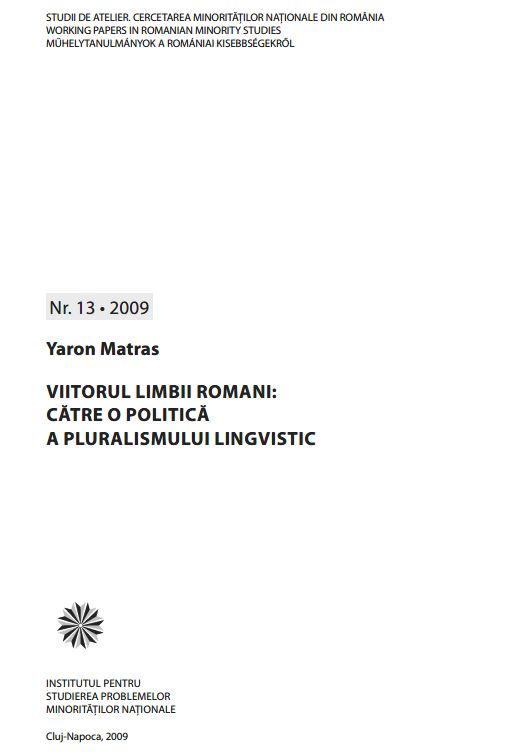
Keywords: Romani language; Use of Romani in education and media; linguistic pluralism; ethnic minority studies;
The past decade has seen the emergence of linguistic pluralism in the use of Romani in institutions such as media and education: language codification is primarily regional, targeting a regional audience. Regional initiatives are autonomous and implement their own solutions. At the same time, an international network of Romani language codification activities is emerging - through meetings, correspondence, exchange of publications, and via the internet. The question facing agencies engaged in language policy is how to pursue networking and international collaboration, while taking into account the de-centralised achievements of the past decade. The practical way forward is to adopt linguistic pluralism as a policy: to support regional initiative and creativity, while also strengthening international networking efforts and exchange. Collective ownership of language will thus encompass a web of language varieties, and not just one single form of the language. Such a policy fits the specific Romani situation of a trans-national minority with dispersed, regional centres of cultural and public life. It is also suitable for the young generation of language users, who are accustomed to trial & error, individual creativity and flexibility in their use of written language in new communication technologies such as text-messages, internet chat-rooms and email.
More...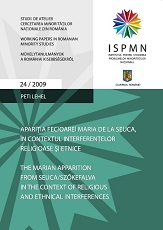
Keywords: The Marian Apparition; Seuca/Szőkefalva; Religious and Ethnical Interferences; Inter-ethnic and Denominational co-existence;
Situated on the border of Latin and Orthodox Christianity, in a region where the infrastructural and the economical possibilities were limited, the Romanian village Seuca became an internationally known place for pilgrimage due to a blind Gypsy women's public visions about Virgin Mary in the first years of the new millennium. The author presents both the history of the ethnical and confessional co-existence in the village and the economical and social problems which affected the whole community. Then, the attitudes towards the apparition of the different denominations will be highlighted by presenting also the way the seer attempts to question the different denominational opinions. The legitimating strategies of a gypsy woman influenced very much the aspects of Virgin Mary vision from Seuca.
More...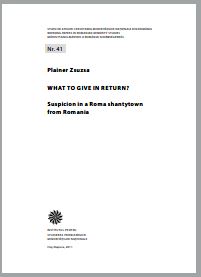
Keywords: Anthropology; Inter-ethnic relations; ethnicity and economics; Stigmatized ethnicity; gender inequality;
By summing up the literature of social anthropology the article provides a broader perspective on the proposed theme. It is especially important that by translating this study Romanian readers have the chance to get acquainted with a small segment of the scientific activity of the researcher. The study of stigmatized ethnicity, gender inequality and precarious work signed by Enikő Vincze, professor of anthropology and gender studies at Babeş-Bolyai University, is a text based on research into social exclusion, multiple discrimination in an East European context, with a look focused on Roma women. Activist research along with the involvement of the researcher in the work of several civic organizations provides a new insight into the current scientific field.
More...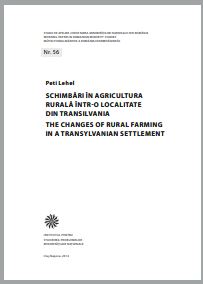
Keywords: Rural farming; Transylvanian settlement; Pluriactivity and diversification; Agricultural activities; Small farms; Sheep farms;
The article analyzes the changes occurred in a Transylvanian village farming. First part of the paper focuses on the economic and social frameworks and context of the rural farming. The main part of the analysis based on the theoretical concepts of pluriactivity, diversification and food self-provisioning and the conceptualization of the special literature analyzes the economic strategies of a Romanian village, seeking to present a typology based on nature of economic strategies. The author argues that the main strategy is pluriactivity, however the limited forms of diversification are also present in the farming patterns of the village, which mark a shift toward a more specialized, profit-oriented farming. Near this strategies the food self-provisioning is also present, what is more there has appeared new ideologies and meanings regarding to food very well known mostly from the western countries' alternative food networks.
More...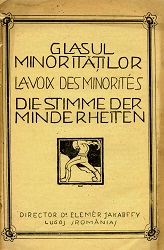
please find in the » Introduction.pdf « a complete Table of Content for all annual issues of 1938
More...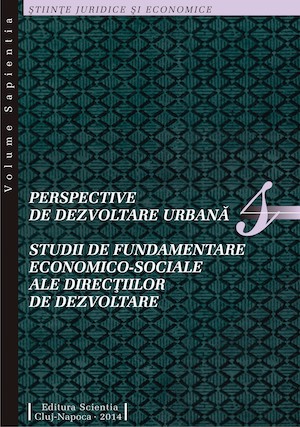
Keywords: economic analysis; industrial districts; SWOT analysis; Miercurea Ciuc;
The first study aims at presenting the economic analysis of the city by elaborating the current situation analysis. The main objective was to develop an accurate analysis on the local economy, on the existing problems and relations within the local economic system. In addition to the secondary data, a field observation was also carried out regarding the situation of industrial districts and other economic activities. After analysing the situation, a SWOT analysis of the settlement was conducted, followed by the definition of the main strategic directions and the formulation of a strategic vision. Following that, three alternative development scenarios were formulated, among which the most viable one was chosen, partly integrating the other two.
More...